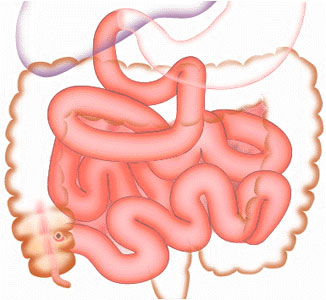What does digestion have to do with your immune system? Surprisingly, a lot. The gut is intimately tied into your immune system and can dramatically effect your overall health. If you have poor digestion, odds are, you have other health problems. Here’s how it works.
Gut Bacteria Produce Vitamins and Hormones
 Gut bacteria help to product vitamins and affect hormone production. Gastrin, for example, produces gastric acid secretion and proliferation of gastric epithelium. Cholecystokinin stimulates the secretion of pancreatic enzymes and contraction and emptying of the gall bladder (where bile is stored).
Gut bacteria help to product vitamins and affect hormone production. Gastrin, for example, produces gastric acid secretion and proliferation of gastric epithelium. Cholecystokinin stimulates the secretion of pancreatic enzymes and contraction and emptying of the gall bladder (where bile is stored).
Secretin helps stimulate the secretion of water and bicarbonate from the pancreas and bile ducts, while ghrelin is thought to be a strong appetite stimulant.
Motilin is involved in stimulating patterns of motility in the stomach and small intestine, while gastric inhibitory polypeptide inhibits gastric secretion and motility while potentiating the release of insulin from beta cells.
A significant amount of the body’s serotonin, the hormone responsible for feelings of happiness, is directly influenced by the gut bacteria, so if you’re having digestive or gut bacteria problems, you could be altering your body’s hormones in a negative way.
Some companies can help you alter or influence your gut bacteria through supplemental probiotics and a general strengthening of the immune system. However, because the body is so complex, it’s unknown as to whether supplemental probiotics will influence serotonin levels.
Probiotics are generally used to improve digestion and motility.
Gut Health Influences Obesity
Gut health can also influence obesity. Researchers have shown in mouse models that fecal transplants from a skinny mouse can help make obese mice thin. And, at least one report has demonstrated the same principle in a human. A woman who received a fecal transplant from her daughter ended up gaining weight after the procedure. The women did the fecal transplant to treat a C.difficile infection (a serious bacterial infection that can lead to a potentially fatal inflammation of the colon).
The daughter, who was a normal weight when the procedure was done and then later gained weight, seems to have imparted her propensity to gain weight onto her mother.
This suggests, though does not definitively prove, that gut bacteria may have a significant influence on weight gain and obesity.
Antibiotic use, NSAID use, changes in diet, a shift to unhealthy foods (processed foods) can all negatively alter gut bacteria, causing unknown changes and side effects over the long term.
And, because weight gain and obesity are so hard to treat, many doctors and researchers suggest that prevention is key. Keeping yourself healthy, eating the right foods, and avoiding excessive or unnecessary antibiotic use, NSAID use, and junk food may play an important role in keeping your gut bacteria healthy.
In addition to this, eating healthy amounts of fiber, specifically soluble fiber, will help feed health gut bacteria.
Gene Expression
Years ago scientists thought that genes were “set in stone” – that your genes couldn’t be altered and if you were born with certain genetic predispositions, you couldn’t do much to change your fate. Today, we know that that’s not true.
Epigenetics is the study of cellular and physiological trait variations that aren’t caused by alterations in the DNA. This is sometimes referred to as gene expression. Foods you eat, and your lifestyle, including digestion, can alter the way your body reacts to various things like stress and poor diet.
Processed foods, for example, dramatically alter the gut micro-biome, and can negatively affect genes responsible for vitamin biosynthesis and metabolism. Some probiotics can influence the activity of hundreds of your genes, helping them to express positive traits that may be cancer-fighting or disease fighting.
It’s still a young science, but more and more evidence is beginning to show that how you eat can impact your short and long-term health, especially as it relates to chronic illness.
Some foods, for example, may cause or minimize low level inflammation. If inflammation increases in the body, and becomes chronic, a variety of diseases could develop. Of course, changes in diet and lifestyle could also reduce chronic inflammation, thereby preventing or minimizing the risk of those same diseases or illnesses.
Gut health and immunity is an emerging science. And, while much is unknown, one thing that seems to keep cropping up is the link between digestion and immune function. Those with impaired digestion seem to have reduced or impaired, altered, or otherwise deficient nutrient absorption, which in turn may contribute to disease.
Kimberly Greenwell is a nutritionist. She loves sharing her fitness insights online. Her articles appear on many health and wellness websites.


I do agree with eating the correct foods and exercise will mean losing weight…but when disabled and unable to do much in the way of regular walking and exercise how does one lose weight then, please?
on June 30, 2015 at 11:12 am Anita PriddyIf getting your gut healthy is what you want to achieve, you may want to try probiotics. They are our gut’s friends. However, nothing beats healthy lifestyle in achieving optimal healthy body.
on August 22, 2018 at 4:17 am Stephanie Cole